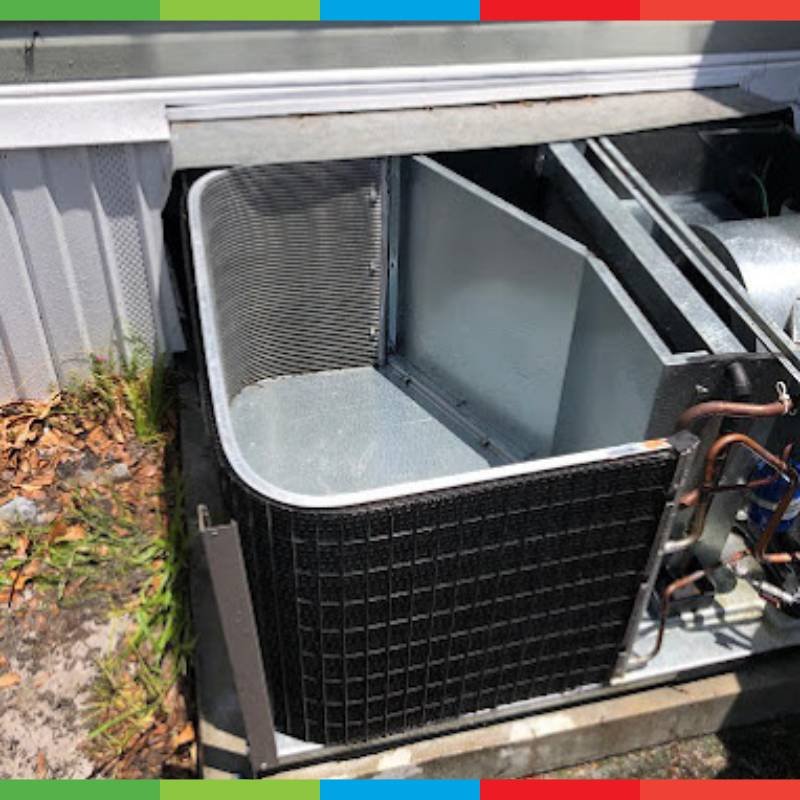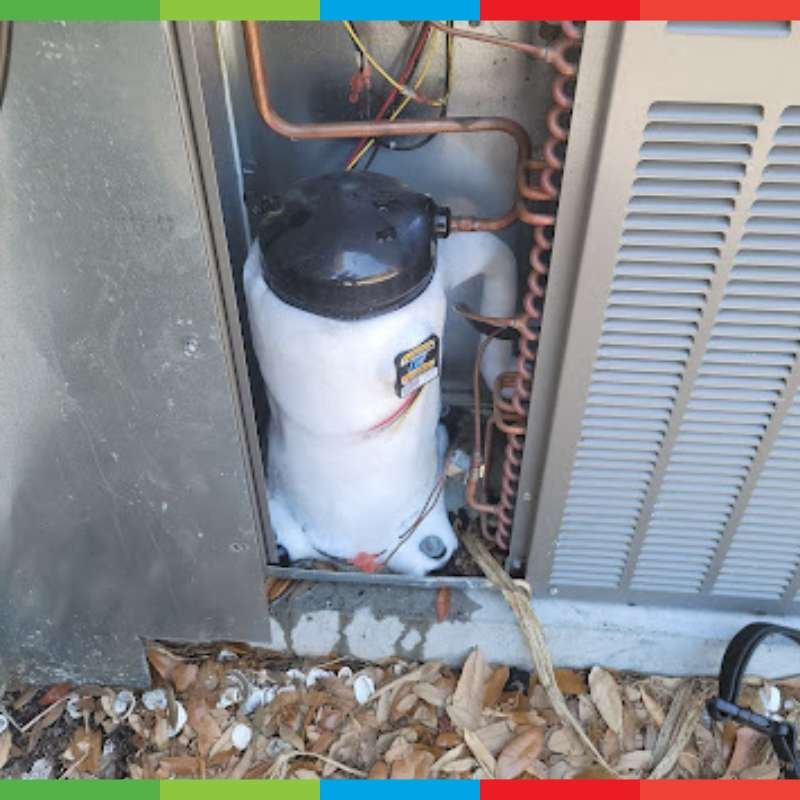AC Repair in Tampa Bay
Are you tired of sweating in the summer heat? Is your air conditioner struggling to keep up with demand? Don't suffer through another hot day – call us today to schedule your AC repair and get back to cool comfort in no time!

AC Repair In Tampa Bay
Stay Cool in the Tampa Bay Heat with Reliable AC Repair Services
At The AC Therapist, we understand how important it is to have a reliable air conditioning system in your home or business. That’s why we offer top-notch AC repair services to keep your unit running smoothly year-round. Our skilled technicians are equipped to handle any AC issue, from simple repairs to full system replacements. We use only the highest quality parts and equipment to ensure your AC is working efficiently and effectively.
Our AC repair services are designed to save you time and money. We offer affordable rates and a quick turnaround time on all repairs. We also offer preventative maintenance plans to help keep your AC running smoothly, which can extend the life of your unit and save you money on costly repairs down the line. Our goal is to provide you with the best possible AC repair services, so you can stay cool and comfortable all year long.
If you’re in need of AC repair services, look no further than The AC Therapist. We are committed to providing excellent customer service and top-quality AC repairs. Contact us today to schedule your appointment and experience the difference that our expert technicians can make.


How to Troubleshoot your AC before Calling Us:
6 Simple Steps to Troubleshoot your AC
If your AC isn’t working properly, there are several simple steps you can take to troubleshoot the problem before calling a professional AC repair technician. Follow these six easy steps to try and identify the issue:
- Check the thermostat: Make sure your thermostat is set to the right temperature and is functioning properly. If it’s not, try replacing the batteries or resetting it.
- Clean or replace the air filter: A dirty or clogged air filter can cause your AC to work harder and reduce airflow. Make sure to clean or replace it regularly to prevent this from happening.
- Check the circuit breaker: Ensure that the circuit breaker for your AC unit is not tripped or turned off.
- Check the float switch: (PVC cup next to the drain line, with 2 black wires coming out of it), there should not be any water inside of it. If there is connect a shop vacuum to the exterior exit of the drain line and suck out as much as you can, then pour bleach or white vinegar down the drain.
- Clean the outdoor unit: The outdoor unit can get dirty or clogged, which can cause your AC to work harder. Make sure to clean it regularly to ensure proper airflow.
- Call a professional technician: If the above steps don’t solve the issue, it’s time to call in a professional technician. They can identify and fix any complex issues with your AC.
By following these six simple steps, you can troubleshoot many common issues with your AC and potentially save yourself the expense of a professional AC repair. However, if you’re unsure or uncomfortable with any of the steps, it’s always best to call a professional technician to avoid further damage or injury.

Why Choose The AC Therapist?
The AC Therapist is not only committed to providing the best AC Repair services, but also providing the right education to homeowners on how to best handle their HVAC units so that small problems do not become larger and more costly issues down the line.
We proudly serve those in the Hillsborough, Pasco, and Pinellas County for over ten years. If you would like more information, feel free to give them a call at (813)-343-2212 or you can book online and get their latest discount!
No Hidden or Unexpected Charges
Free Estimates & Online Booking Available
Professionally Trained Technicians
Honesty is Guaranteed
Quick Communication & Service Within 24 Hours
400+ 5 Star Reviews
Looking For More Than Just AC Repair?
We happily provide service to Hillsborough, Pinellas, and Pasco Counties.
Your questions answered
Common AC Repair Questions:
What are common fixes for AC not cooling?
There are several common fixes for AC not cooling issues that you can try before calling a professional technician:
Check the thermostat: Make sure your thermostat is set to “cool” and that the temperature is set lower than the current room temperature.
Clean or replace the air filter: A dirty or clogged air filter can reduce airflow and cause the AC to work harder, leading to insufficient cooling. Clean or replace the air filter if it’s dirty.
Check the ductwork: Check the ductwork for any leaks or gaps, as this can cause cool air to escape and make your AC less efficient. Seal any leaks or gaps.
Clean the condenser coils: The condenser coils in the outdoor unit can get dirty, reducing the efficiency of your AC. Regular cleaning of the outdoor unit can help prevent this issue.
Check the refrigerant levels: Low refrigerant levels can cause your AC to not cool properly. A professional technician can diagnose and fix this issue.
Check the fan motor and blades: If the fan motor or blades are not functioning properly, they can cause the AC to not cool effectively. A technician can diagnose and repair these issues.
If these solutions don’t work, it’s recommended to call a professional AC repair technician to diagnose and repair any complex issues.
Is it worth repairing an AC unit?
Whether it’s worth repairing an AC unit depends on several factors, including the age of the unit, the cost of the repair, and the expected lifespan of the unit after the repair. Here are some considerations to keep in mind:
Age of the unit: If your AC unit is over 10 years old, it may not be worth repairing as it may have already reached the end of its expected lifespan.
Cost of the repair: If the cost of the repair is more than half the cost of a new AC unit, it may not be worth repairing.
Efficiency: If your AC unit is inefficient, it may be more cost-effective in the long run to replace it with a more energy-efficient unit.
Frequency of repairs: If your AC unit requires frequent repairs, it may be more cost-effective to replace it rather than continue to pay for repairs.
Comfort needs: If you rely heavily on your AC unit for comfort, it may be worth repairing it to avoid discomfort during hot weather.
Overall, if your AC unit is relatively new and the cost of the repair is reasonable, it may be worth repairing. However, if the unit is old, inefficient, and requires frequent repairs, it’s likely more cost-effective to replace it with a newer and more energy-efficient model. It’s recommended to consult with a professional technician to determine the best course of action for your specific situation.
How do I know if I need AC repair?
There are several signs that may indicate that your air conditioner needs repair. Here are some common indicators:
Warm air blowing from the vents: If your air conditioner is blowing warm air instead of cool air, there may be an issue with the refrigerant or compressor.
Poor airflow: If your air conditioner is producing low airflow, it may be due to a dirty air filter, blocked ducts, or malfunctioning fan motor.
Unusual noises: If your air conditioner is making unusual noises such as grinding, squeaking, or banging, there may be an issue with the fan motor or other components.
Foul odors: If your air conditioner is producing unpleasant odors, it may be due to mold growth, dirty air filters, or other issues.
High humidity: If your air conditioner is not effectively reducing the humidity levels in your home or business, it may be due to an issue with the evaporator coil or refrigerant levels.
Short cycling: If your air conditioner turns on and off frequently, it may be due to a malfunctioning thermostat or an issue with the compressor.
If you notice any of these signs or other issues with your air conditioner, it’s important to have it checked by a professional AC repair technician. They can diagnose the problem and perform the necessary repairs to ensure your air conditioner is functioning properly and efficiently. Regular maintenance and inspections can also help prevent potential issues before they become major problems.
Should I turn off AC if it's not cooling?
Yes, if your air conditioner is not cooling, it’s recommended to turn it off to prevent any potential damage or safety hazards. Continuing to use the unit while it’s not cooling properly can cause the compressor to overheat and may result in more extensive damage. It’s recommended to call a professional AC repair technician to diagnose and fix the issue to ensure that your air conditioner is functioning properly and efficiently.
What is the most expensive part of an AC unit to replace?
The most expensive part of an AC unit to replace is typically the compressor. The compressor is the heart of the air conditioning system and is responsible for pumping refrigerant through the system to cool the air. If the compressor fails, the entire AC unit may need to be replaced, as it’s often more cost-effective to replace the entire unit rather than just the compressor.
The cost of replacing a compressor can vary depending on the size and type of the unit, as well as the specific brand and model of the compressor. On average, the cost of a compressor replacement can range from $1,500 to $2,500 or more, including labor costs.
It’s important to properly maintain your AC unit to help prolong the lifespan of the compressor and other components. Regular maintenance, such as cleaning the coils and changing the air filters, can help prevent potential issues and save on AC repair costs.
How many years should an AC unit last?
The typical lifespan of a central air conditioning system is between 12-15 years with proper maintenance and usage. However, factors such as the quality of the unit, the level of maintenance, and the climate in which it operates can impact its lifespan.
Regular maintenance, such as cleaning the air filters and coils, can help prevent potential issues and prolong the lifespan of the central AC system. Additionally, using the unit within the manufacturer’s recommended guidelines and avoiding overuse can also help extend its lifespan.
If your central AC system is reaching the end of its expected lifespan or experiencing frequent issues, it may be time to consider replacing it with a newer, more energy-efficient model. It’s recommended to consult with a professional technician to determine the best course of action for your specific AC repair situation.
Why won't my AC go below 75?
If your AC won’t go below 75 degrees, there may be several reasons why it’s not cooling properly. Here are some common causes:
Thermostat setting: Make sure the thermostat is set to the desired temperature and is functioning properly. If the thermostat is not working properly, it may not accurately read the room temperature.
Dirty air filter: A dirty air filter can restrict airflow and reduce the cooling capacity of your AC. Check the air filter and replace it if it’s dirty.
Insufficient refrigerant: Low refrigerant levels can cause your AC to not cool effectively. A professional technician can diagnose and fix this issue.
Leaky ducts: Leaky ducts can cause cool air to escape and reduce the efficiency of your AC. Seal any leaks in the ducts.
Issues with the compressor: If the compressor is not functioning properly, it can cause the AC to not cool effectively. A professional technician can diagnose and fix this issue.
Insufficient size of AC unit: If the AC unit is too small for the size of the space it’s cooling, it may not be able to effectively cool the area.
It’s recommended to call a professional technician to diagnose and fix any complex issues with your AC. By identifying the underlying issue, you can ensure that your AC is functioning properly and effectively cooling your space.
How do I know if my thermostat is bad?
If your HVAC system is not functioning properly, it’s possible that the thermostat may be the cause of the issue. Here are some signs that your thermostat may be bad:
Incorrect temperature readings: If your thermostat is not accurately reading the temperature in your home or business, it may be due to a malfunctioning thermostat.
Inconsistent heating or cooling: If your HVAC system is not consistently heating or cooling, it may be due to a thermostat issue.
The HVAC system won’t turn on: If your HVAC system won’t turn on or won’t respond to changes in the thermostat setting, it may be due to a faulty thermostat.
Short cycling: If your HVAC system is turning on and off frequently, it may be due to a malfunctioning thermostat.
The display is blank: If the display on your thermostat is blank or not functioning, it may be due to a malfunctioning thermostat.
If you notice any of these signs or suspect that your thermostat may be the cause of the issue, it’s recommended to call a professional technician to diagnose and repair your AC. They can replace the thermostat if necessary or identify and fix any other underlying issues with your HVAC system.
How do you know if your AC needs freon?
Freon is a refrigerant that is used in air conditioning systems to cool the air. If your AC is not cooling properly, you may be wondering whether it needs more Freon. Here are some signs that your AC may need more Freon:
Warm air blowing from the vents: If your AC is blowing warm air instead of cool air, it may be due to low Freon levels.
Poor airflow: If your AC is producing low airflow, it may be due to low Freon levels.
Hissing or bubbling noises: If you hear hissing or bubbling noises coming from your AC unit, it may be due to a refrigerant leak and low Freon levels.
Ice on the evaporator coil: If you notice ice on the evaporator coil of your AC unit, it may be due to low Freon levels.
High energy bills: If your energy bills have increased and your AC is not cooling effectively, it may be due to low Freon levels.
It’s important to note that low Freon levels may not always be the cause of these issues. It’s recommended to call a professional AC repair technician to diagnose and fix the issue. They can test the refrigerant levels and identify any leaks in the system, as well as recommend the best course of action for your specific situation. It’s also important to note that adding more Freon to your AC unit is not a DIY project and should only be done by a licensed professional.


